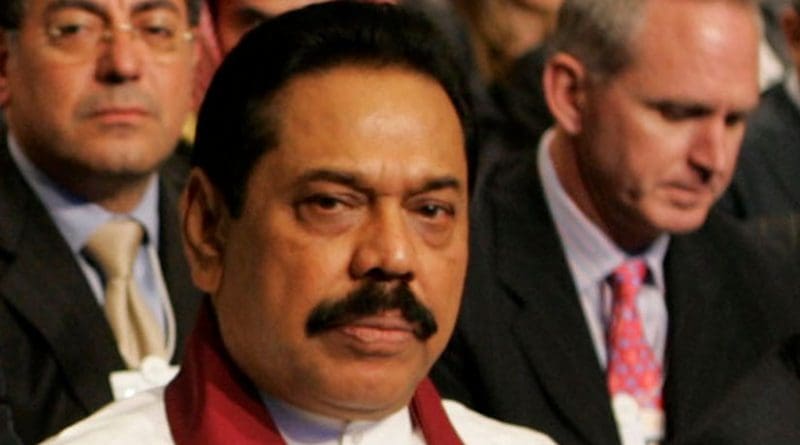Sri Lanka’s Constitutional Reform: Rajapaksa Backlash? – OpEd
The incumbent Sri Lankan government comprising of the two major political parties, the Sri Lanka Freedom Party (SLFP) and the United National Party (UNP), and a number of small political groups represented in the national legislature initiated a constitutional reform process almost in the immediate aftermath of ascending to power in 2015. The move was influenced partly by the fact that the coalition won both the presidential and the general election with the tacit support of the Tamil National Alliance (TNA), which mainly represents the Tamil people.
Parliament has been converted into a constitutional assembly and subgroups have been appointed to study specific areas of constitutional reform. A number of subgroups have already submitted their reports. Moreover, a panel of experts appointed to study public opinion on constitutional reform has also handed over its findings. Despite the progress, the process is also expected to face some serious hurdles from within Sri Lankan polity.
Rajapaksa Defeat
Mahinda Rajapaksa, the former president of Sri Lanka, not only provided leadership to the military campaign, which eventually crushed the Liberation Tigers of Tamil Eelam (LTTE), but also claimed that his government was solely responsible for the end of the war (in 2009). Even the role of the armed forces was understated. Ending the war, Rajapaksa believed, would enable him to rule to the country in the long term. This belief was also reinforced by the increasing popularity of Rajapaksa and his family. The constitutional limit of two terms in office for the president was removed in 2010 through the 18th Amendment to the constitution. This enabled Rajapaksa to contest the presidential election for the third time.
A confident Rajapaksa decided to conduct the presidential election in 2015, two years ahead of schedule. He lost. In August of the same year, his government also lost the general election to the incumbent ruling coalition. Since Rajapaksa believed that he was unfairly defeated in 2015 due to the influence of minority groups and interference of international forces, instead of going into retirement, he entered parliament as an ordinary member. He also opposed the SLFP’s decision to form a coalition government with the UNP. Periodically, he was also criticizing the government.
Meanwhile, the government investigated the allegation of corruption by Rajapaksa and members of his family. Basil Rajapaksa, one of the younger siblings and a former minister was arrested and detained. Two of his sons are being investigated for corruption and abuse of power. Many Rajapaksa loyalists make regular visits to the Financial Crimes Investigations Division (FCID) to make statements and answer questions.
New Party
The idea of forming a new political party under the leadership of Mahinda Rajapaksa has been discussed ever since he lost the presidential election in January 2015. In the early days, the idea was used as a tool to blackmail the government. The goal was to pressure President Maithripala Sirisena to nominate Rajapaksa as the prime ministerial candidate in the general election. Later the idea of a new political party was also used to halt the criminal investigation or what Rajapaksa loyalist called harassments against the Rajapaksa family. However, the idea was never materialized partly due to Rajakapksa’s unwavering commitment and loyalty towards his party, the SLFP. He took pride in the fact that he never betrayed the SLFP.
However, now, it has become clear that recapturing power from within the SLFP will be extremely difficult, if not impossible. Therefore, the only way out for the Rajapaksa and his loyalists to have any impact would be to form a new political party. Consequently, a new political party has been formed by renaming an old party registered with the Department of Elections.
The new group is called the Sri Lanka People’s Front (SLPF). One of the staunch supporters and former minister, G.L.Peiris has been appointed leader of the SLPF. Basil Rajapaksa has already officially joined the new party. It is believed that at an opportune time Rajapaksa will take over the new group.
Resistance
This is where the constitutional reform process could face some serious challenges. Rajapaksa and his loyalists represent the nationalist Sinhala faction of the Sri Lankan polity. Nationalists are opposed to any form of devolution of power. Devolving powers to the North-East Provinces has been one of the stated objectives of the current constitutional reform process. A concrete proposal for the new constitutional is expected to be released in early 2017. Therefore, Rajapaksa and the SLPF will most certainly become active with the release of the proposal and mobilize the people against any form of devolution of power. The new group will argue that the devolution of power would disintegrate the country. Rajapaksa has already declared that 2017 will be a decisive year for Sri Lanka and hinted that he intend to target the devolution proposal as he stated that the government’s devolution package will divide the country.1
It is imperative to note that any drastic changes to the present constitution would require the approval of the people in a national referendum. Moreover, currently, about 50 members of parliament, who are loyal to Rajapaksa, sit in the opposition benches of the national legislature. The group calls itself the Joint Opposition (JO) and serves as the de facto opposition party. The group obviously opposes any concessions to the Tamil minority. When the new constitution is presented to parliament for approval, some more members could join the JO, which will make getting the necessary two-thirds majority cumbersome. Hence, Rajapaksa’s opposition to the devolution of power and his ability to mobilize Sinhala people against constitutional reform would create a major impediment to conflict resolution and reconciliation in Sri Lanka.
Notes:
1. http://www.slguardian.org/2017/01/2017-will-be-decisive-for-sri-lanka/

